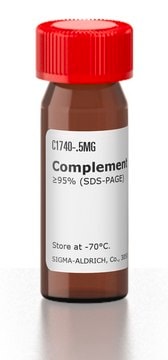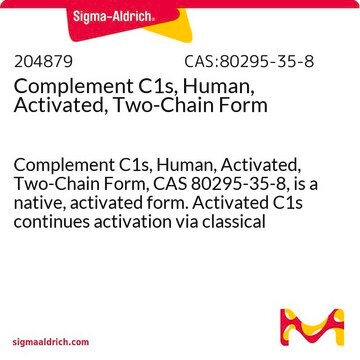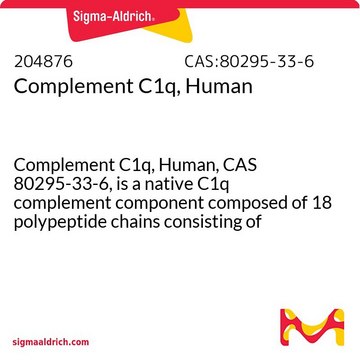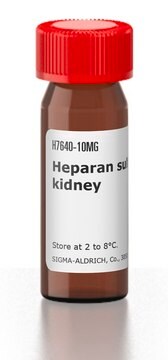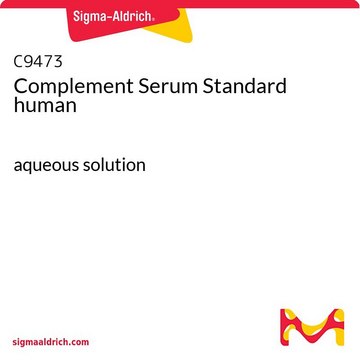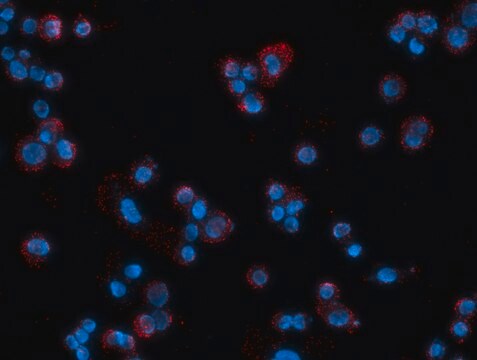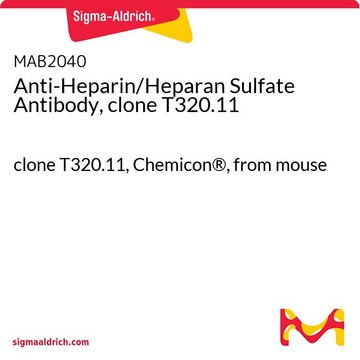204873
Complement C1, Human
Complement C1, Human Native, is the first component of the classical complement pathway. It is a calcium-dependent complex of C1q, C1r, and C1s subcomponents.
Autenticatiper visualizzare i prezzi riservati alla tua organizzazione & contrattuali
About This Item
Codice UNSPSC:
12352202
NACRES:
NA.25
Prodotti consigliati
Livello qualitativo
Stato
liquid
Produttore/marchio commerciale
Calbiochem®
Condizioni di stoccaggio
OK to freeze
avoid repeated freeze/thaw cycles
Condizioni di spedizione
wet ice
Temperatura di conservazione
−70°C
Descrizione generale
Native, human C1 complement component. C1 is the first component of the classical complement pathway. It is a calcium dependent complex of C1q, C1r, and C1s subcomponents which are present in the C1 complex at molar ratios of 1:2:2 respectively. Binding of C1 to classical pathway activators results in the conversion of the proenzyme C1s subcomponent to an active C1s enzyme. C1s enzyme cleaves both C4 and C2, resulting in formation of the C3 cleaving enzyme, C4b, C2a, of the classical complement pathway. C1 concentration is based on functional activity measurements relative to a normal serum standard pool.
Native, human C1 complement component. C1 is the first component of the classical complement pathway. It is a calcium-dependent complex of C1q, C1r, and C1s subcomponents which are present in the C1 complex at molar ratios of 1:2:2, respectively. Binding of C1 to classical pathway activators results in the conversion of the proenzyme C1s subcomponent to an active C1s enzyme. C1s enzyme cleaves both C4 and C2 resulting in formation of the C3 cleaving enzyme, C4b, C2a, of the classical complement pathway. C1 concentration is based on functional activity measurements relative to a normal serum standard pool.
Confezionamento
Please refer to vial label for lot-specific concentration.
Attenzione
Toxicity: Standard Handling (A)
Stato fisico
In 300 mM NaCl, 50 mM sodium acetate, 50 mM EACA, 25 µM NPGB, 10 mM benzamidine, 10 mM EDTA, 40% glycerol, pH 5.5.
Altre note
Cooper, N.R. 1985. Adv. Immunol. 37, 151.
Ziccardi, R.J. and Cooper, N.R. 1977. J. Immunol. 118, 2047.
Ziccardi, R.J. and Cooper, N.R. 1977. J. Immunol. 118, 2047.
Note legali
CALBIOCHEM is a registered trademark of Merck KGaA, Darmstadt, Germany
Codice della classe di stoccaggio
10 - Combustible liquids
Classe di pericolosità dell'acqua (WGK)
WGK 1
Punto d’infiammabilità (°F)
Not applicable
Punto d’infiammabilità (°C)
Not applicable
Certificati d'analisi (COA)
Cerca il Certificati d'analisi (COA) digitando il numero di lotto/batch corrispondente. I numeri di lotto o di batch sono stampati sull'etichetta dei prodotti dopo la parola ‘Lotto’ o ‘Batch’.
Possiedi già questo prodotto?
I documenti relativi ai prodotti acquistati recentemente sono disponibili nell’Archivio dei documenti.
Réka Á Kovács et al.
Frontiers in immunology, 11, 599771-599771 (2021-02-26)
Elements of the immune system particularly that of innate immunity, play important roles beyond their traditional tasks in host defense, including manifold roles in the nervous system. Complement-mediated synaptic pruning is essential in the developing and healthy functioning brain and
Ahsan Habib et al.
Cell transplantation, 27(4), 666-676 (2018-06-07)
Alzheimer's Disease (AD) is the leading cause of dementia in the elderly. In healthy individuals, amyloid precursor protein (APP) is cleaved by α-secretase, generating soluble α-amyloid precursor protein (sAPPα), which contributes neuroprotective functions in the neuronal environment. In contrast, in
Il team dei nostri ricercatori vanta grande esperienza in tutte le aree della ricerca quali Life Science, scienza dei materiali, sintesi chimica, cromatografia, discipline analitiche, ecc..
Contatta l'Assistenza Tecnica.